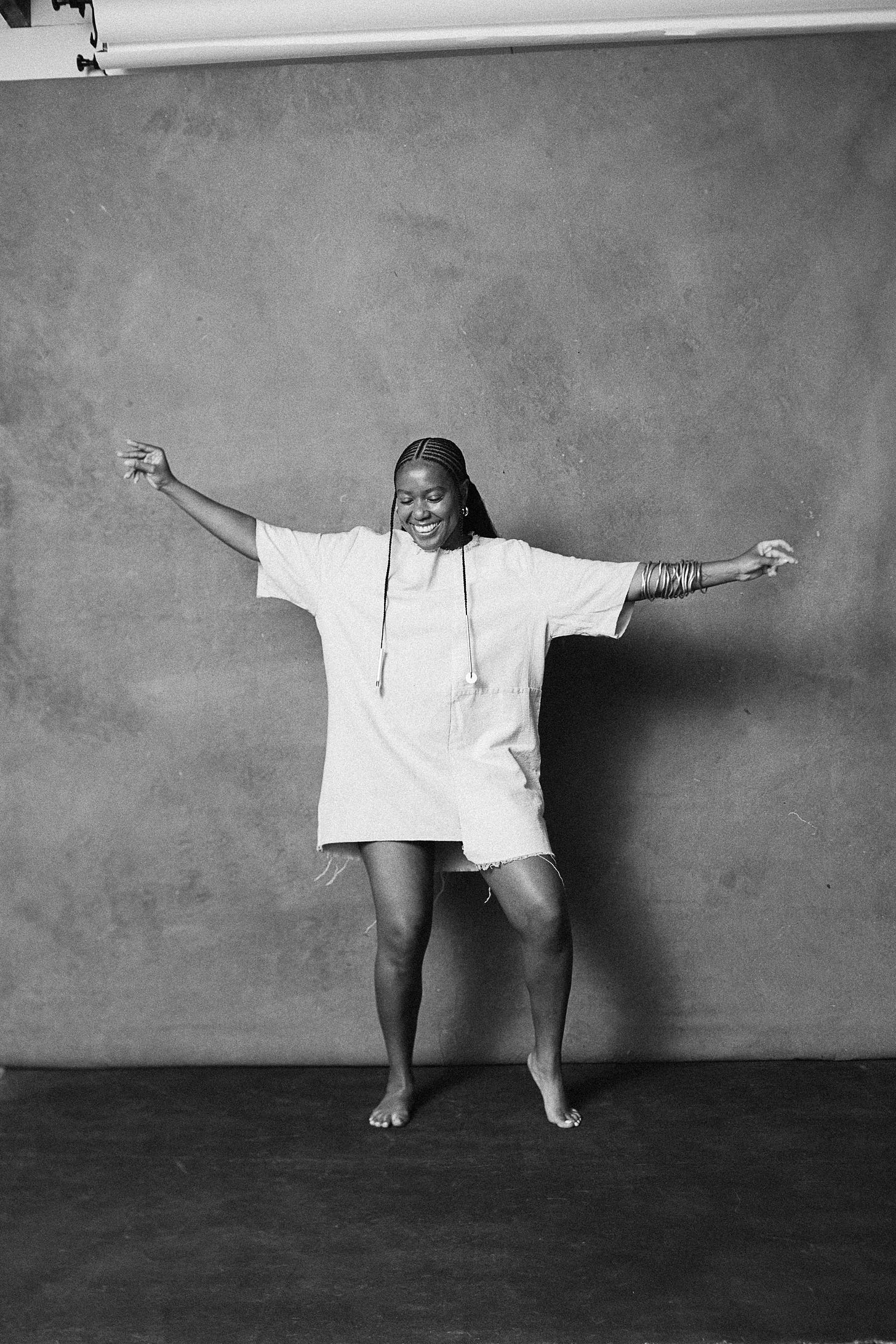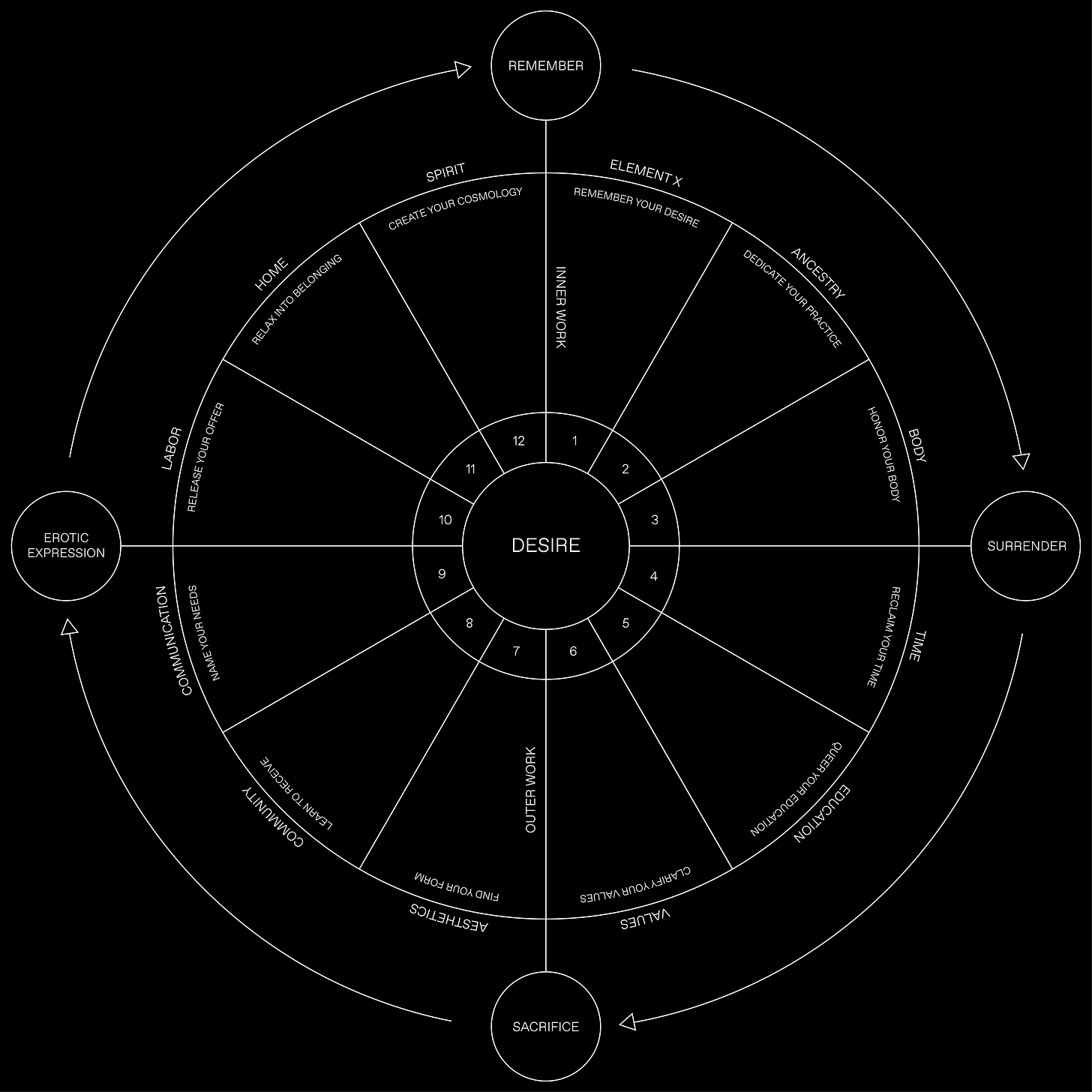
“Disciplines are coded and presented as disconnected from experiential knowledge…disciplines differentiate, split, and create fictive distances between us. Discipline is empire.”
— Katherine McKittrick, Dear Science and Other Stories (2021), pg. 36
May all disciplines die.
May all binaries fall.
I’m talking about the binaries we don’t have enough wisdom to create. Not the sun and the moon or the north star and the south star or the summer and the winter or the up and the bottom or the joy and the pain. Speculation as a method is transcendent in the same way, as it allows us to break free from constructs that feel synthetic…if only for a breath or two.
“The method is rigorous, too. Wonder is study. Curiosity is attentive. Black method is therefore not continuously and absolutely undisciplined (invariably without precision, invariably undone). Black method is precise, detailed, coded, long, and forever. The practice of bringing together multiple texts, stories, songs, and places involves the difficult work of thinking and learning across many sites, and thus coming to know, generously, varying and shifting worlds and ideas.”
— Katherine McKittrick, Dear Science and Other Stories (2021), pg. 5
Become aware of this breath and breadth now. N.K Jemisin describes “Element X” as a premise that informs how some mysticism, fantasy or magic unfolds in a world we make up. The creators of the Powerpuff Girls asked, “what if Chemical X?” The creators of X-men asked, “what if mutation?” The creators of Black Panther asked “what if Vibranium?” In Cykofa I asked, “what if abolition?” This “what if” question informs the “Element X” of your story. A speculative device shaping what can and does happen.
What if I am a better writer than I am a business woman?...is a question I finally allowed myself to utter this week. There are times business strategies go unexecuted because the pull of the pen is too great to ignore. I prioritize writing because it is the most rigorous thing. It is the thing that terrifies me the most, which is to say, the thing I must do. This irresistible practice crystallizes into skill. I write to think out loud, like now. What if the splits between business and writing, play and engineering, art and science are “fictive distances” disconnected from experiential knowledge? What if I closed the distance with something real, something less synthetic…if only for a breath or two?
Discipline feels like empire. I experience the most unnecessary suffering in my practice when I refuse to allow myself to prioritize the most pleasurable work. When I refuse to allow myself to trust it’s viability and prioritize the more legible forms of expression instead. I prioritize business development, software engineering and systems design knowing it’s the darkness that brought me to the doorstep of these disciplines in the first place — the shadow, the abstraction, the poetry, the questions folks in these disciplines weren’t allowed to ask. Like “what if a business cares more about going deep rather than going wide?” or “what if software engineering and biotechnology have something to teach us about the ontology of blackness?” or “what if we designed systems that optimized for play and rest instead of efficiency and productivity?” What if?
Intuitively, I understood discipline was an artifact of empire in undergrad, the first time I was “formally” able to honor my anti-disciplinary curiosity. “Innovation, Design and Society” was the major I created, cobbling together three buzzwords that felt broad enough to justify taking business, dance, sculpture, astronomy, architecture, computer science, philosophy and black gender studies classes. But the interdisciplinary major couldn’t protect me.
At some point in the computer science classroom the little black girl who fell in love with coding on MySpace realized there wasn’t enough space here. At some point in the business school classroom the little black girl who fell in love with commerce and resource exchange while selling gimp on the playground realized there wasn’t enough space there either. I’ve been trying to close that “fictive distance” between me and that little black girl ever since. I couldn’t find a space large enough to accommodate her anti-disciplinary desire so I gave her a school instead.
“...Black methodology and method-making (which are academic and extra-academic), offer rebellious and disobedient and promising ways of undoing discipline. And those of us who work in these places that weigh us down can carve out surprising and generous spaces that challenge existing political visions, allow us to fight against inequity and racism, work against racial violence, and collaborate.”
— Katherine McKittrick, Dear Science and Other Stories (2021), pg. 41
“Nevertheless, black women artists continued to adopt performance art for specific ends, be it autobiographical expression, or to bridge the gap between black communities and artistic experimentation, or as a manifestation of the long-useful strategy of “acting out.””
— Uri McMillan, Embodied Avatars: Genealogies of Black Feminist Art and Performance (2015), pg. 6
Reminding myself Seeda School is an art project and not solely a business continues to create capacity in my audacity. Remembering this is a pedagogical performance practice shifts something loose — something like the tyranny of discipline. Insisting my Zone of Desire is a landscape I can trust to sustain me. Holding my Element X as a chisel I hammer with desire into the stone of reality, knowing all I need to invoke this performance is a question.
“In their sly reincarnations, these polymaths, ever attuned to their marginality, utilize the tools of performance art to partially defy it, becoming obdurate and obstreperous objects. In their shape-shifting qualities, they collectively forsake ontological certitude for the variously embodied.”
— Uri McMillan, Embodied Avatars: Genealogies of Black Feminist Art and Performance (2015), pg. 226
The spell works best when it’s the most erotic question you can think of.
What if I don’t write for a living, but I have a writing life?
What if I write the book I want to read?
What if I made work that my ancestors would recognize as mine?
What if my poetry is a response to the call?
Expand capacity inside of your audacity by welcoming this performance of call and response, a performance of a black method of survival you are inventing in real time. Breathe in, breathe out. All you need to invoke this performance is an erotic question.

Erotic Engineering is a black feminist method that proposes beauty, poetry and speculation as non-negotiable breathwork. An anti-disciplinary framework that invites us to create our own methods of living beyond survival. The Erotic Engineering framework is visualized as a compass for getting lost so we may find ourselves, not anew, but perhaps differently determined.
“These scalar experiments and mobile laboratories are speculative projects that envision new modalities of relation and offer blueprints for unanticipated existence.”
— Saidiya Hartman, “Crawlspace Manifold” (February 12, 2023), published in Torkwase Dyson: A Liquid Belonging (2023), pg.14
“The grammar of black feminist futurity is a performance of a future that hasn’t happened yet but must. It is an attachment to a belief in what should be true, which impels us to realize that aspiration. It’s the power to imagine beyond current fact and to envision that which is not, but must be. It’s a politics of prefiguration that involves living the future now.”
— Tina Campt, Listening to Images (2017), p. 17
Beauty is a method1. “Notes on Erotic Engineering” as in music. “Remember”, “Surrender”, “Sacrifice”, “Erotic Expression” as in movements. Action as in rehearsal. “Innerwork” and “Outerwork” as in resonance. Elements as in keys. Poetry is a method. A compass is both a wayfinding device and an architectural tool. We use it to draw a map and also leave the map behind, allowing ourselves to be pulled by the magnetic force of our south star, our desire. A quick search tells us “there is no “south star” that serves as a perfect southern counterpart” to the north star, which is fitting. The word “practice” is supposed to release perfectionism, not invite it. Speculation is a method. What if we perform a future that hasn’t happened yet but must? What if discipline is empire and we let it die?
What if we live?
Erotic Engineering Workshop: Desire Embodiment Challenge
Join us inside The Laboratory of Erotic Engineering to run your own scalar experiments informed by your “what if?” question, your “Element X”. This September, the first experiment that we will run inside The Lab is a 28 day Desire Embodiment Challenge unique to your practice and the mode or method or erotic expression you are being called to trust.
Enroll by September 3rd, 2025 to receive the Zoom link to join us inside this week’s workshop.
If you're like me, the dreaming is often easier than the doing, the writing is often easier than the work of embodiment and you know the talk ain't got nothing on the walk. Erotic Engineering invites us to prioritize the rehearsal of both in our practice. Writing down our commitments then challenging ourselves to act on them in small but sacred ways, not only builds self trust and confidence, but allows us to live the future now.
If you want to learn more about The Laboratory of Erotic Engineering before enrolling drop your email into the form on the landing page linked above to get the discovery workshop replay, Element X Quadrant Worksheet and Erotic Engineering Syllabus.
If you’ve already engaged with the Discovery Workshop then you can enroll directly on that same page. Membership inside the Laboratory is billed monthly since our programming of Erotic Engineering support is monthly but you can cancel at any time in your account settings. If you just want to join us this September for the 28 Day Desire Embodiment Challenge that is completely fine. We’d be honored to practice with you for as long as it feels desirable and accessible.
P.S. Feel free to share this flyer with a friend and embark on a 28 Day Desire Embodiment Challenge together!
“Beauty Is a Method” written by Christina Sharpe. Published in e-flux Journal Issue #105, December 2019


